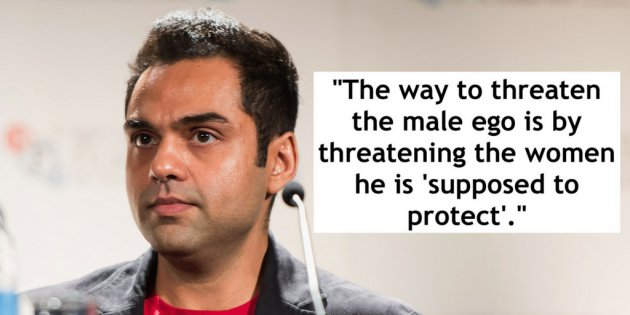It is a known fact that the Indian film industry, much like any other field, has strong patriarchical notions at its core. Whether off screen or on screen, women are relegated to the backseat in the film industry, much like all other professions. Issues of gender pay gap, glorification of harassment in movies, women playing second fiddle to men, casting couch, and many more are proof that misogyny is rampant in Bollywood. However, it is not often that we see members from the film fraternity actively speak up about it. This is where Abhay Deol, known for his offbeat movie choice, stands out.
Recently, Goa based NGO Video Volunteers, conducted a live chat with the actor on issues of gender discrimination, patriarchy, portrayal of women in Indian cinema, and gender gap within the industry. What transpired was an interesting conversation, which touched upon some pertinent issues.
Let us briefly look at some of the points discussed
- Gender Pay Gap – He acknowledges its existence and says “The more you hear the West do this, the more we follow. We don’t necessarily put it out there first. But yes, I think it will get translated here when it is established there. The pay should depend on the job at hand but not on one’s sex.” We have earlier written on the issue of gender pay gap.
- Glorification of Harassment of Women – He says that it is rampant and cites the example of the Hindi classic ‘Sholay’ in which Dharmendra’s character (Veeru) pursues Hema Malini’s character (Basanti). He points out how ‘Ranjhana’, which glorified stalking, and it was something he had pointed out to the filmmaker. “The problem is in glamourising it [stalking]. The problem is not necessarily with the filmmaker but with the system that we have to work out of. If you don’t glamourise…if you don’t make a hero out of him, then people will wonder why they are even watching this.” Recently, renowned comedy group, All India Bakchod had come out with a video on this very issue of how Bollywood has normalized sexual harassment.
- Female Directors – According to him, women filmmakers have a greater understanding of the female psyche. “I think women tend to write women better than men. Women directors are much more sensitive with women characters than the male directors. Not that the men can’t do it, but they tend to project their idea of femininity sometimes.”
- Pleasing the Audience – He talks on how filmmakers aim to please the masses i.e. the predominantly male audience, as it makes more ‘business sense’. “Women audiences are considered if you make a Neerja or Queen or Kahaani. I don’t think they [filmmakers] are thinking of the female audience when they are making a big blockbuster because I think we have more of a male population than a female population, and the movies that are typically formula tend to appeal to young men to have a good laugh. That’s why women in their films tend to be just gorgeous, glamour models and then they have an item number.”
- Role of Men in Dealing with Chauvinism – He says it is intrinsic in our society, he says, “If most men are aggressive and chauvinistic then it takes another chauvinist to tell them to see their own ways. It won’t take another woman because they won’t take her seriously. That’s why they are chauvinist. Patriarchy is something we (men) created and it’s something we have to resolve.”


It is heartening to see that a male actor has spoken up about issues which are often swept under the carpet, on a public forum. Abhay Deol hits the bull’s eye when he says that men need to be involved to deal with chauvinism. It is a sentiment we echo wholeheartedly, and our #AllGenders conference in August talked about this very point, wherein we stressed the need to engage men and boys in the fight against patriarchy. Additionally, Mr Amitabh Kumar, Head of Media and Communications at Centre for Social Research, is one of the experts in MARC (Men Advocating Real Change), a global community of men committed towards gender equality, reitarating the fact that men need to be a key driver in ensuring a gender sensitive society.
At Centre for Social Research, we sincerely hope that more male public figures, speak up about misogyny. Unless these issues are discussed in public platforms, we cannot expect change to take place.
Discuss this article on Facebook




